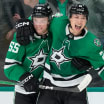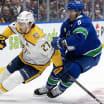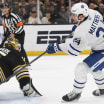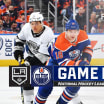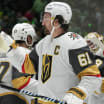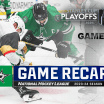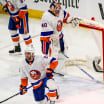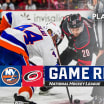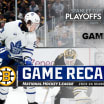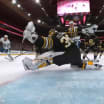NEWPORT BEACH, Calif. -- Becoming one of the Hanson Brothers was easy for Steve Carlson.
Then a 20-year-old free spirit, he was suited for his role in the cult-classic film "Slap Shot."
Remaining Steve Hanson for the past 40 years has been a bit more difficult.
40 years later, Hanson Brother embraces 'Slap Shot'
Life after classic film not always easy for former NHL player Steve Carlson
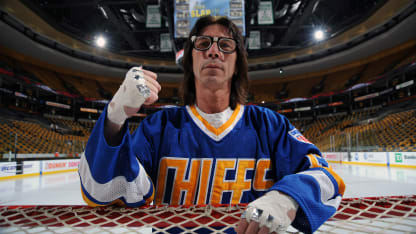
© Steve Babineau/Getty Images
Somehow Carlson has navigated what at times has been a frustrating, demanding road -- not all that different from the long minor-league bus rides romanticized in the iconic 1977 hockey movie -- through four decades, slipping regularly between his real-life persona and that of the goofy, violent, yet lovable Steve Hanson, one of the three brother characters who are central to the film.
"We just talked about this, me and my wife," Steve Carlson said of Vicki, his wife of five years. "I said to her, 'You know, I was really [upset] after we made 'Slap Shot' that I would be going, playing, making it to the NHL, making it to the [World Hockey Association], playing pretty well and everyone recognized me as an actor.'
"I would never talk about 'Slap Shot,' I would never want to mention 'Slap Shot' because I was a hockey player, not an actor.
"She said, 'Why don't you mention that stuff? Why don't you tell people that stuff, that it bothered you?' I said, 'Oh well, that's not the way I am. It did bother me at the beginning, but it's my livelihood."
Indeed, Carlson, 61, talks about and mentions the movie almost every day now as he tours the world as one of the Hansons, making solo appearances or showing up with his movie brothers: real-life sibling Jeff and lifelong friend Dave Hanson, who played Jack Hanson in the film when Jack Carlson couldn't make the shooting schedule because he had been called up to the WHA.
Released Feb. 25, 1977, "Slap Shot" is celebrating its 40th anniversary, and the franchise is as strong as ever. This weekend, other cast members and fans from all over the world were scheduled to join the Hansons for festivities in Johnstown, Pennsylvania. Steve and Vicki were the main organizers of the event, which was to include a game at Cambria County War Memorial Arena, the movie home of the Charlestown Chiefs.
The Hanson Brothers receive more than 300 requests a year to make appearances.
"They've [always] been doing things for that movie, so it just shows how great the movie was and how popular it was," said retired NHL defenseman Ken Daneyko, a television analyst for the New Jersey Devils. "They're still, to this day, going to arenas, rinks and making appearances.
"It was a classic. They did a heck of a job for not being actors. It was outstanding."
Steve Carlson never thought the Steve Hanson role would become his lot in life. He was going to be a hockey lifer, as a player and then as a coach, not a nostalgia act.
But after 14 years as a professional player and another six as a minor league coach, living his own version of the Hank Snow country classic "I've Been Everywhere" -- Marquette, Johnstown, St. Paul, Hartford, Edmonton, Los Angeles, Nashville, Birmingham, Baltimore, Memphis; I've been everywhere, man! -- Steve Carlson knew it was time to end his pro hockey journey.
At the time, he was coaching the Memphis Riverkings, a middling team in the Central Hockey League. The Riverkings weren't drawing well enough, and the then-38-year-old coach, after two decades of grinding, called it a career.
But for a Hanson Brother, when one penalty-box door closes, another opens. A simple suggestion from the Riverkings GM had paved the way for a second act.
In attempt to get more bodies into the Mid-South Coliseum, the home of the Riverkings, a reunion of the Hanson Brothers was pitched during Steve's final season coaching in Memphis. At the time, Dave Hanson was the general manager of the Capital District Islanders, an AHL team based in Albany, New York. Jeff Carlson had been retired from hockey for a decade and had gone home to Minnesota.
The three decided to get back together and were greeted by a full house at the Mid-South Coliseum. A few weeks later, they did a second reunion at the Houston Field House, home of the Capital District Islanders -- another sellout.
"We were like holy crap, there's a little more security here," Steve Carlson said. "There's more security in doing the Hanson Brothers than coaching in the hockey world."
The demand for the Hanson Brothers grew exponentially from that modest start. Opportunities as paid pitchmen increased. Suddenly the Hansons were traveling across North America, raising funds for charities and making good money.
They were a brand, much the same as a rock band or a movie star. It's certainly helped that the Hanson Brothers were naturals, enjoying a chemistry and an easy comfort level around people.
"We are fun-loving guys, we don't care; this who we are, on the ice, off the ice," Steve Carlson said. "We play off each other, we laugh at each other."
Watch the three at a standard meet-and-greet; they have a routine that is perfectly choreographed and rarely goes awry.
They line up, right to left, in the numerical order of their Charlestown Chiefs sweaters: Dave (No. 16), Steve (No. 17) and Jeff (No. 18). Dave signs the item when the fan approaches, while Steve engages that fan in conversation, enthusiastically shaking hands. Then Steve signs, passing the person down to Jeff, where the process repeats itself. Over and over, sign, shake hands, small talk, smile for each person at the appearance. Laughs are commonplace throughout the interactions.
For more telling moments, watch their interactions with their peers still involved in the game they all love. In late December, the Hanson Brothers were at Prudential Center during a morning skate to film promotional spots for NHL Network's 40th anniversary documentary on "Slap Shot."
Seconds after walking through the Zamboni entrance, the three men had their noses pressed against the glass, their aluminum-foil encased hands banging against the surface to get the attention of the Devils players. Each time they were noticed, they laughed and slapped one another on the back.
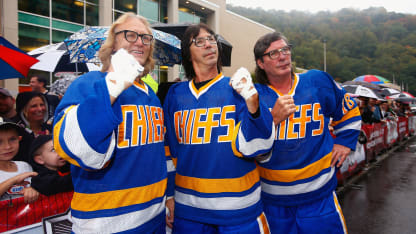
© Jared Wickerham/Getty Images
Almost immediately, Devils television analyst John MacLean came bounding out of the seats to talk shop and take a picture with the trio. MacLean, a former Devils coach and one of their most famous goal-scorers, was thrilled to appropriate Steve Carlson's trademark glasses and grab a handful of Dave Hanson's jersey for a photo.
"I like the movie so much because of those Hanson Brothers, of course. That stereotypical French goalie, doing the interview in his own way, so funny," MacLean said, mentioning Charlestown Chiefs goalie Denis Lemieux (played by Yvon Barrette), whose heavy accent is a running gag throughout the film. "They hit every little tidbit of our game. Was it overdone? Yes, in certain ways it was as far as that goes, but the little subtleties of it. They all happen to be half-truths; but they did it in such a funny way with how they handled it all and brought it to the screen."
Later, in the Devils dressing room, several players approached the trio, asking for pictures and expressing how much they enjoy the movie. Even general manager Ray Shero wandered into the room, all smiles as he pressed between Dave and Steve for a keepsake photo. Jeff is more in the foreground, his left hand, wrapped in foil and tape, presented to the camera as a fist.
Or, watch Steve during a solo appearance like the one last month at the Port Theater in Corona Del Mar, California, where he was the guest of honor at a "Slap Shot" screening hosted by clothing company Violent Gentlemen, which was launching a line of Hanson Brothers apparel.
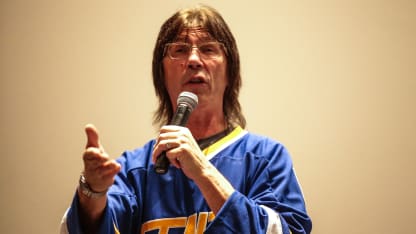
As a queue of eager fans formed, Steve Carlson, in sneakers, blue sweatpants and his omnipresent Chiefs sweater, wrapped his arm around one bearded fan, laughing heartily as the fan flashes a tattoo of Carlson's face on his forearm to the camera as a picture is snapped. He chatted intently with another fan about Carlson's time as a high school coach in Kenosha, Wisconsin, a decade ago. He grabbed each of Violent Gentlemen's founders, Mike Hammer and Brian Talbert, by his jacket collar, jacking them up in a classic fighting pose. Later, he slowly settled his long, still-lean frame into a seat at the back of the refurbished theater as the lights dim for the movie, happily calling out some of the key lines a split second before they are spoken on the screen.
These scenes repeat themselves wherever the brothers may roam.
\\\\\\\\\\
Steve Carlson is comfortable in his skin now, content with being a living, breathing tribute to the notion of "old-time hockey."
He is no longer self-conscious, no longer questions what he is doing when he promotes the movie that made him more famous than his hockey exploits did.
"People can make fun of us, but who cares?" he said. "Oh well, that's your thought. So what? I'm not going change for you. You adjust to me. You go your way and I'll go mine.
"I'm still going to be happy. It took me a while in life to get happy, but I'm with a great woman and I'm happy as hell."
It wasn't always so.
In the beginning, Steve Carlson was a 6-foot-3, 185-pound center selected by the Detroit Red Wings in the eighth round (No. 131) of the 1975 NHL Draft and by the Minnesota Fighting Saints in the fifth round (No. 73) of the 1974 WHA Draft.
He had big hockey dreams.
Carlson was a darn-good pivot who was pigeonholed by the general public and some of his peers because of his movie role as a hockey miscreant capable of mischief and mayhem at any moment. In Hollywood terms, he had been typecast; mistakenly so.
"He sort of got lost in that Hanson/Carlson thing," said Blair MacDonald, a teammate during Carlson's one season in Edmonton. "I think it was hard to get rid of that stigma. He got painted with that brush."
Some evaluators may have allowed the movie character's attributes to bleed into their reports about Steve Carlson, it seems.
"He was a good hockey player," said Gene Ubriaco, who coached Carlson with the Nashville South Stars and Birmingham South Stars in the Central Hockey League and with the Baltimore Skipjacks of the American Hockey League, all after Carlson's stints with Minnesota, the New England Whalers and Edmonton Oilers of the WHA and the Los Angeles Kings of the NHL.
Ubriaco, now a senior adviser and director of hockey operations for the Chicago Wolves of the AHL, said Carlson, his captain in Nashville and Binghamton, was an elite faceoff man who developed into an above-average player by relying on his hockey smarts.
"He was one special guy," Ubriaco said. "He has earned every nickel he has gotten. I look at him as a really special person."
Despite the movie-generated aura of menace, Carlson never registered 100 penalty minutes in a season, not even during his two years (1974-76) with the Johnstown Jets in the Wild West atmosphere of the North American Hockey League. He did score more than 20 goals five times in his various minor league stops and had 18 goals in his lone season with the Oilers.
"He played the game honest, but [rough stuff] wasn't really his shtick," MacDonald said. "He was a good player. He had a two-way game; he could play defense."
Carlson called Gordie Howe (by then a Hockey Hall of Fame member) and Dave Keon (a future Hall of Famer) teammates with the Whalers, and played with Wayne Gretzky in Edmonton.
And Carlson himself is in elite hockey company: He and Blaine Stoughton are the only two professional players to each have been a regular linemate of both Gretzky and Howe.
\\\\\\\\\\\\\\\\*
Steve Carlson grew up on the Iron Range of Minnesota, in the tiny town of Virginia. Three hours north of St. Paul on Route 35, Virginia is surrounded by hockey-playing outposts of some renown, including Eveleth, Hibbing and Warroad.
Virginia, though, has held its own when it comes to the sport.
The Carlson brothers -- Jeff, Jack and Steve, each separated by a year -- were at the forefront of a wave of players who came out of Virginia and played professional hockey. John Harrington, a member of the 1980 "Miracle on Ice" United States Olympic team, played there, as did former NHL players John Gruden and Peter LoPresti. Pittsburgh Penguins forward Matt Cullen and Washington Capitals defenseman Matt Niskanen also hail from Virginia.
Steve Carlson left home to chase his hockey dream in 1973, joining his older brothers with the semipro Marquette Iron Rangers of the United States Hockey League.
That is where Ubriaco, coaching the Chicago Warriors, first crossed paths with Steve and his brothers. Ubriaco still remembers the unusual power play Marquette deployed, breaking into laughter as he tells the tale.
The Carlsons, he said, were the three forwards on the unit, and their preferred method of attack was to knock down all the penalty-killers in the attacking zone and then score a goal.
The next season, the Carlsons went to the Jets, taking the Pennsylvania steel-mill town and its minor league team by storm. The Carlsons played a big role in helping the Jets win the NAHL title in 1974-75. Steve had 30 goals and 58 assists in 70 regular-season games.
That got the attention of the Fighting Saints, Johnstown's parent club, who eventually called up each of the brothers.
Jack was the first to make the move, but it cost him his chance to be a part of "Slap Shot." Jeff and Steve, left behind in Johnstown, jumped at the chance to make some quick money, not thinking too much about the long-range implications.
"We negotiated for about five seconds," Steve Carlson said, laughing easily as he sat at the kitchen table of a rented villa in Newport Beach before a solo appearance as Steve Hanson later that night.
"We made $12,000 to play hockey with the Minnesota Fighting Saints. Our first three paychecks bounced. The chance to make almost what we did as a player for almost three months' work [filming the movie]? Now, I don't have to work that summer."
Upon its release, "Slap Shot" was not well-received, despite having Paul Newman on the marquee and George Roy Hill as the director. Hill had won an Academy Award in 1974 for "The Sting," another starring vehicle for Newman.
"Slap Shot," though, was seen as too vulgar and dark to be a mainstream hit, panned by many of the biggest movie critics.
"When it came out, I was playing for the New England Whalers," Carlson said. "We didn't get blasted but we got frowned upon by the hockey world because [people thought] we were making a mockery of the game. But, that was the way the game was played in the old American League when they changed the name to the North American Hockey League. The puck was dropped and the gloves came off, that was just the way it was."
The film was relegated to margins at first, but the introduction of VCRs soon after its release, and the boom of cable television several years later, gave "Slap Shot" a second life as a cultural touchstone for hockey fans.
"Over my lifetime, I've probably seen it 50 times," Washington Capitals coach Barry Trotz said. "When you're young, everybody saw it three times a year."
Steve Carlson had no idea what lay ahead when he committed to making the movie, not only during the three months of often monotonous filming in the spring of 1976, but also in the decades to follow.
Like most things up to that point, it was a lark, done without much forethought. Hockey was the current, and Carlson was content to ride it wherever it might lead.
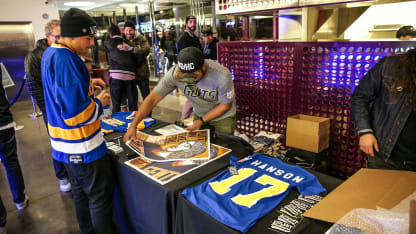
But the spur-of-the-moment decision came to define his future more than his hockey accomplishments would.
His character became bigger than him. He is recognized almost everywhere he goes as Steve Hanson, No. 17 for the Charlestown Chiefs, the player who famously, and with great vigor, tells the referee he is "trying to listen to the song" when confronted before the championship game, in the film's penultimate scene.
He and his movie brothers are remembered for the long hair and the black safety glasses held together by white tape. They are embraced for the race cars and the violence against the soda machine; celebrated for "putting on the foil" and "old-time hockey."
"I think just them being complete lunatics on the ice is something [we] remember and laugh at," said Ryan Whitney, a retired NHL player who said he has seen the movie between 30 and 40 times. "They all look the exact same, they are all basically working together in causing complete ruckuses every time they are on the ice. The Charlestown Chiefs took on a new life when they came, so people will forever remember these three animal brothers running around killing people. That's what 'Slap Shot' is known for."
Teammates during his playing days were of a similar mind, but usually were more interested in the wild on-set stories than prejudging Steve Carlson.
"It was pretty cool," MacDonald said. "We talked about [the movie] a couple times. He would just laugh when we talked about it. He was real humble about it. It was never a big thing."
As hard as it has been at times for him to come to terms with such a legacy, Steve Carlson still smiles when he reflects on it because the movie accurately portrayed the Hanson Brothers.
"I think we come across as goofy, fun-loving guys that just want to have a good time," he says, shaking his head. "That's the way we were and I think that is what we put across on the screen."
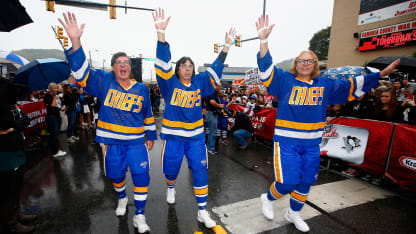
© Jared Wickerham/Getty Images
The antics, it seems, were all true. Well, mostly true.
The race car sets? Those were a Sunday staple for the Jets.
Steve and Jeff, along with Dave Hanson and Guido Tenesi, who played pretty-boy defenseman Billy Charlebois in the movie, shared a house in Johnstown.
Dave and Tenesi lived on the third floor, with the Carlsons on the second floor and the landlady on the ground floor. Each Sunday, the players would remove the furniture from the third floor, housing it on the second floor, and set up the racetracks. With the Johnstown bars closed on Sundays, it became a perfect place for the team to come together each week.
"What we did is we bought three race-car sets and set them up throughout the house and got a keg and had the team over for a party and bet on our cars, who's going to win," Carlson said. "It's just the way we were. Just fun."
The foil? That was never used, but a less glamorous substitute often was. Unlike the Carlsons, the Hansons employed foil in the movie as a nefarious trick for when fisticuffs flared. But Steve Carlson said scuffed leather golf gloves, heated on the radiator to a hardened state and worn underneath hockey gloves, were pretty common among players in the NAHL for a while.
"For the movie, they just made it outrageous and over the top," he said.
Of all the cartoonish antics in the movie, Carlson said none were much of a reach.
Nancy Dowd, who wrote the screenplay for "Slap Shot" after embedding with the Jets for a couple of weeks, perfectly captured the trio. So the movie brothers did not need much help channeling the motivation for their characters in front of the camera. They failed only when they tried too hard to be something they were not, Carlson said.
"We were trying to be actors and it wasn't working," said Carlson, one of many players to be offered parts because, unlike most actors, they could skate. "Hill and Newman said, 'Listen guys, you know what you are supposed to do. Just make us laugh. Just do it, make us laugh.'"
\\\\\\\\\\\\\\\\\\\\*
Steve Carlson is still making people laugh.
He does it now by posing for a picture, quoting any of the myriad tried-and-true lines in the movie -- "Hi Ogie! Buy ya a soda after the game?" -- or taking part in a bit of playful banter with the kids who always tag along with their movie-loving parents to his appearances.
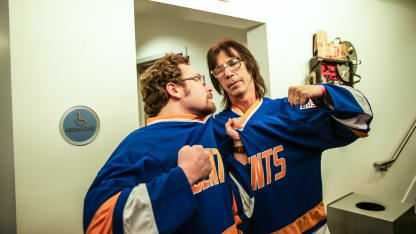
Carlson knows his audience, and the ability appeal to it has always come easily.
"That's what we do, we play off each other, we don't rehearse," Carlson said. "That's the way we are. We laugh, we joke, we have our lines with fans. We just have fun with them."
The Hansons have been doing the nostalgia circuit for almost 25 years. The schedule has gotten lighter the past few.
"Granted we are getting older," Carlson said, "granted the travel is tougher, granted it has taken a wear and tear on our bodies, but I'm still having fun doing it."
So almost every weekend, the three men gather somewhere in North America, don their safety glasses and either the blue or white Charlestown Chiefs jerseys and make sure somebody has the foil. Then they make another public appearance, entertaining in their own way the still-sizable crowds that heed the "Slap Shot" call.
Along the way, Carlson has gone from frustrated to amazed about the role the film plays in his life.
He happily receives adoration from the people, hears them talk about how a 40-year-old movie has impacted their lives and reflects on how that same film has affected him.
In the end, he is grateful for it all. He knows the Hanson Brothers have something organic, that something special that makes any long-running endeavor withstand the test of time.
"We don't need a gimmick to make people happy, just like AC/DC doesn't need a gimmick to make great music or the Rolling Stones or KISS," Carlson said, sitting at the kitchen table, articulating the lessons he has learned during his long and winding journey as Steve Hanson. "They have their gimmicks, but you expect that from them and they make sense. If you need gimmicks for the sake of gimmicks, than there is something wrong with your talent.
"We don't need that stuff. We just be ourselves and you like us, or you don't. We try to make everyone happy, but you can't please everyone."

